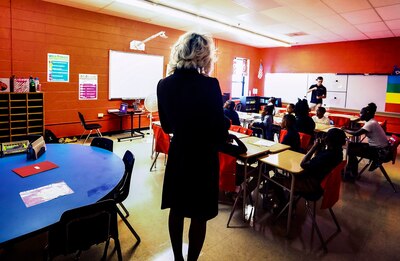After more than 20 years in traditional Memphis schools, Alethea Henry is making the leap to the state’s controversial turnaround district and will bring with her lessons learned from Shelby County Schools’ heralded Innovation Zone.
But Henry is clear that her switch in allegiance is mostly to follow the iZone’s former leader and new Achievement School District chief – Sharon Griffin. Shelby County Schools iZone is a group of 24 low-performing schools within Memphis’ traditional district that won praise for improving student test scores under Griffin.
“I decided to join the ASD…primarily because of the opportunity to serve under the awesome leadership and tutelage of Dr. Sharon Griffin,” said Henry, who is now in charge of support teams for the state district. “My tenure in the iZone afforded me the opportunity to learn valuable lessons. Fortunately, I have been able to apply those lessons learned in my new role with ASD.”
Tonye Smith McBride is also joining the state district’s leadership team after decades in Memphis’ traditional district. McBride and Henry coached iZone principals and educators alongside Griffin. Appointing two people with experience coaching administrators offers a clue to Griffin’s strategy of working with teachers and principals to improve student performance.
Schools in the iZone have outpaced progress of those run by the state, which have struggled to show academic improvement. The Achievement School District – now comprising 30 schools, most of them in Memphis – was launched in 2012 to transform the state’s worst performing schools by converting them to charter schools.
Education Commissioner Candice McQueen and Griffin have said that the state district needs more consistency from school to school, and McBride will lead the charge to share best practices across charter operators.
“As part of the iZone, I served as a principal, instructional leadership director and eventually director of school improvement and accountability for the entirety of SCS,” McBride said. “When you combine all of these together, the work is very much the same…just lots more of it.”
McBride said her new role will focus on ensuring charter operators are following federal and state laws. Similar to her previous roles in Shelby County, McBride will oversee the district’s Special Education team, support career and technical education, and create system-wide “practices to meet the academic and social-emotional learning needs of our students.”
McBride coached dozens of iZone principals – including the principal of Trezevant High School, a school within the iZone where reports of improper grade changing launched an ongoing investigation within Shelby County high schools. McBride was not implicated in grade changing and a team of outside investigators found no evidence that she was involved in any other wrongdoing.
Griffin told Chalkbeat she’s confident McBride is up for the steep challenge of improving state-run schools. Recent test scores remain far below the statewide average and dropped in high school.
“When she was a principal, Chief McBride knew how to take a school from a low-performing school to the next phase,” Griffin said.
For Henry, some of her lessons learned include establishing deep support for teachers, something Griffin said educators within the state district have told her was lacking. Henry will focus on improving teacher training and is in charge of creating a strategic plan for “addressing instructional needs across the entire ASD portfolio,” she said.
“Just like every child is different, so are teachers and schools,” Henry said. “Support must be intentional and meet the unique needs of the people being supported. It is no one’s job to ‘fix’ teachers.”
The remaining team members, Robert White and Lisa Settle, have been in state-run leadership for years, and Griffin said she was excited for the context and experience they will bring.
White will continue to work on bettering the district’s historically stormy relationship with its communities – and will focus on telling the district’s story of a new era under Griffin’s leadership.
Settle has been with the turnaround district since the beginning. She moved from the position of chief performance officer, where she made sure charter operators followed federal and state rules, to the chief of operations and culture/climate. Griffin said Settle will now oversee the district’s relationship with Shelby County Schools and focus on building maintenance. Many of the achievement district’s school buildings are leased from Shelby County Schools and need repair.
“I’m still with the district because we aren’t finished – there’s work still to do,” Settle said. “One thing that is changing now is the way we view support needed. We were an authorizer of charter schools, and we still are, but there are traditional district functions we need to provide like a focus on academics, and support around building maintenance.”
Still missing from Griffin’s team is a second in command. When Griffin was hired in April, the state Department of Education announced that it would also “soon add a leader to oversee the development and support of high-quality public charter schools, and this role will work closely with Dr. Griffin to support the portfolio of charter operators serving schools in the Achievement School District.”

Sara Gast, spokeswoman for the department, said the right person hasn’t been found for the role yet, and they are still actively seeking candidates.
Griffin acknowledged that the current team will have to do more with less. A year ago, more than half of 59 central office staff positions were slashed to cut costs, and a new leadership team was brought in under then-superintendent Malika Anderson. Griffin’s team of four is significantly smaller than that of Anderson.
“I believe we have the right people in place and skill set to impact student achievement,” Griffin said. “But there is added responsibility for us because our team is smaller.”
Verna Ruffin, the turnaround district’s chief academic officer, was recently hired as superintendent of a school district in Waterbury, Connecticut, White said. Six former members of central office staff took positions with charter operators within the turnaround district or pursued other opportunities after the restructure last year.
Griffin said now that the new team is in place, they can get to work.
“I have to make some changes while hitting the ground,” Griffin said. “I needed people who understood the context and could get things done.”

